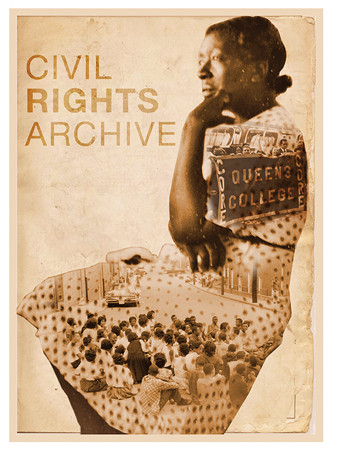Queens College/CUNY in New York has an important archive with a wealth of documents about the activism of their staff and students during the Civil Rights Movement in the 1960s. However, not a lot of people associate New York with the Civil Rights Movement and even fewer people know that Queens College has an extensive archive of this history.
To bring attention to the history and resources, the archive staff called on the college’s graphic design department for help. The results are the stunning images below.
While the assignment was a for a college course, it would also work well in high school. Queens College graphic design instructor Ryan Hartley Smith shared the following description of the assignment he gave in 2012-2013 to his students.
Students were responsible for creating posters to promote the Archives to fellow Queens College students.
The classes began the design process by meeting with the archives staff, touring the collection, and gathering information that would form the basis of their design concept. Once students had contextualized the material, they were able to peruse the collections and select documents to scan and work from. It was established at the outset that the archives would ultimately select a series of the designs to be published.
First, the project introduced students to working on a client-directed project. As opposed to a graphic design professor, the classes had to present their concepts to archives staff, communicate through email about the scanning and formatting of materials, and change their designs based on the archives’ feedback.
Second, the project created an entrance to discuss cultural representations in design and mass media production. This is a topic that is rarely explicitly addressed in art and design studio classes, and it was helpful to have a singular assignment to focus these discussions towards. Queens College is one of the most culturally diverse colleges in the country, and the classes possessed a wealth of experience and insight to bring to these talks.
At the end of the process, a series of designs were selected by archives staff. They are currently displayed throughout the campus.
About the Archives
The Clock Tower at Queens College’s Rosenthal Library which houses the archive is named after James Chaney, Mickey Schwerner, and Andrew Goodman–three civil rights workers who were murdered by the KKK in Mississippi during the summer of 1964. Two of the civil rights workers had connections to Queens College. Andrew Goodman was a Queens College undergraduate, just starting as a summer volunteer when he was killed. Mickey Schwerner’s wife Rita was a Queens College alumna and his brother was on the faculty at Queens College at the time. Mickey and Rita, experienced community organizers, were in Meridian, Miss. as CORE staff doing voter registration and related work. James Chaney was a young, local Meridian civil rights activist who had been expelled from his parochial school for wearing a civil rights movement button. Chaney was serving on the staff of CORE when he was murdered. Among a longer list of former Queens College students who also worked in Mississippi were nationally known activists such as Dorothy Zellner, Mario Savio, and Lucy Komisar.
About the Collage Featured on This Page
The woman prominently featured in the collage on this page is Mrs. Polly Heidelberg. She was an outspoken, local Meridian advocate and organizer who played a key role in supporting the large Freedom School there. The 1964 photograph is by Mark Levy, one of Queens College’s other summer volunteers in Mississippi and coordinator of the Freedom School in Meridian. Embedded in her figure are 1963 images of Queens College civil rights student activism: a busload of Queens College students arriving at the August 1963 March on Washington and a demonstration in Farmville, Prince Edward County, Virginia. The Farmville photo was taken by one of the delegation of Queens College volunteers, Phyllis Padow-Sederbaum, who went there to teach for the summer because the county had closed all its public schools as a policy of “massive resistance” rather than comply with court-ordered desegregation.
Our thanks to the students for giving us permission to share their artwork: Tammy Jackson, Olivia Joel, Madison Chajon, Elena Akulova, and Nick Panteleros.













Twitter
Google plus
LinkedIn